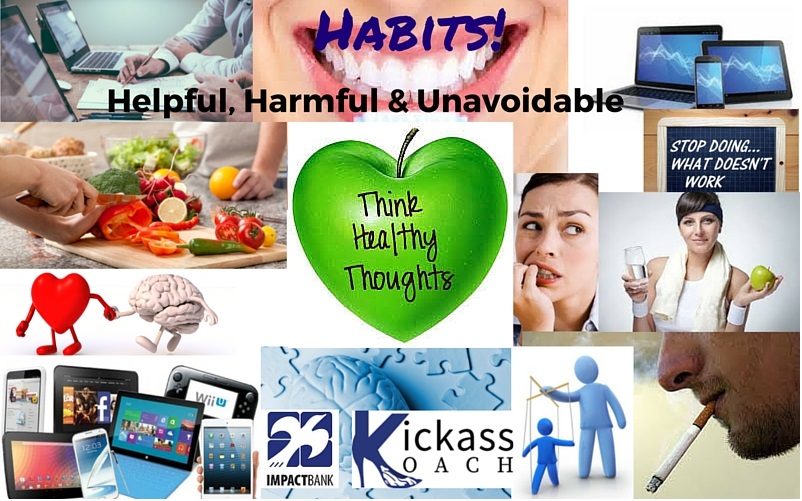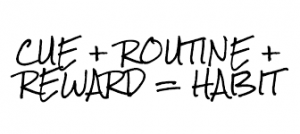Habits will drive performance – yours and those who report to you SO it it wise for Leaders to BE habitual NOTICE-ERS!
At ImpactBank, we exclusively work with Senior Leaders during their first two years in a new assignment – we have a signature system we call ON YOUR MARK….™ focusing on those critical first 6 months in a new role. Contact us if you or a senior leader in your organization is moving into a new role and wants to “hit their MARK” quickly and effectively. We are conducting an experiment with ON YOUR MARK….™ in fall 2016 with the addition of a social learning component…we are currently accepting applicants.
Contact Rox directly at rox@impactbank.ca for a no obligation conversation to see it if would benefit you.
Habits are behaviors wired so deeply in our brains that we perform them automatically. This allows you to follow the same route to work every day without thinking about it, liberating your brain to ponder other things, such as what will bring out the best in your people today.
Some Background….
As part of my research and after developing my definition I came across an article about an MIT study (from the neuroscience department) that is very interesting. Specifically Professor Ann Graybiel, a member of the McGovern Institute for Brain Research at MIT says,
“the brain’s executive command center does not completely relinquish control of habitual behavior. A new study from MIT neuroscientists has found that a small region of the brain’s prefrontal cortex, where most thought and planning occurs, is responsible for moment-by-moment control of which habits are switched on at a given time”.
While I found most pundits around habit focus on breaking habits or finding a formula to understand them, I am most interested in examining how and when they are positive tools or obstacles a leader can leverage to achieve her or his mandate.
While I continue to struggle to find clarity on this subject matter I have decided to use myself over the next four weeks as my own test subject.
A Habit I want to understand more fully: my addiction to checking my smart phone.
A Story….or maybe a confession!!
As many of you may know from a lengthy post I wrote, on Friday May 20th I marked the 10th anniversary of my Dad’s death by building a day of reflection. One of my planned activities was a long 6 hour walk with various carefully chosen points along the way where I would stop for reflection. I noticed how every time I paused, and periodically even while walking, I felt compelled to check my phone. Because of the unique kind of day I had planned it didn’t feel appropriate so when I found myself reaching into my bag to grab the phone the first time, I immediately resisted almost feeling repelled by the phone itself. I noticed throughout the morning how often my mind wandered to what might be happening on my phone. I continued to resist until I needed to know the time. I no longer wear a watch because my phone is my time keeper – this was a dilemma. I told myself I would just check the time but as I did I couldn’t help but notice a few messages that had come in – both texts and emails from clients, colleagues and friends. It took all my self control to resist checking for details. While I succeeded for the course of the specific activity I was struck by two things: how obsessively strong the compulsion was AND how I binged in my review and electronic engagement in the 30 minutes upon arriving back home.
As I have reflected further I realize just how much impact this habit has over my daily routine, my workweek and my life. This is the habit I will focus attention upon during this series in hopes of understanding it more clearly and finding ways to ensure it serves me and NOT the other way around.
Join Me!?
048: How will using my Infra-Limbic Cortex change my path
This week was an opening for me. I am spending the week noticing and digging deeper into my habits. Review the plans for the supporting episodes below and then check the strategies I am employing. I challenge you to join me.
049: Habits of the Mind
Habits of the mind includes our ways of seeing and being in the world. This is different than the habits of the brain which are more about how our brain processes, manages or navigates using habit. Habits of the mind are more about patterns of seeing and thinking and being in the world. Here I will explore links to my strengths or preferences.
050: Habits of Thinking – The Einstein
Habits of thinking may relate to habits of the mind. I will consider this as I explore in week three. I link it to Einstein because of my favourite quote from him – “our current problems will not be solved at the level of thinking with which they were created.” I suspect my exploration here will relate more to executive functioning than simply patterns but I am open to whatever insights are inspired.
051: Systemic Habits – The Killer of Innovation
Systemic Habits – I have observed that organizations are susceptible to being caught in unhelpful ruts of thinking that limit their innovation and adaptability making them less open to diversity in every way imaginable and thereby more prone to the power of hubris. This look forward to this part of the exploration – AND I hope to encounter a few surprising insights for myself.
Strategies
048 – I have already started my journey of discovery as I described in the podcast and as I continue to reflect and shift into preparation for next episode, I will add more detail here. For now these are the things I’ve been doing:
- Paying attention to my habits –

- I have identified 7 I want to reflect further on.
- I will simply be observing 4 of them for future reference (I will explain why)
- I am going to work privately on 2 of them
- AND the one I highlighted in the episode I will continue to share my progress and journey through the series – it has actually grown a bit since I first identified it and even since recording my episode.
- Becoming clear about the antecedents or triggers that compel me to act
- And consider the reward that is earned – I am patiently observing the rewards associated and so far this has proven the most interesting
Influence, productivity and success doesn’t just happen—you either create it, or you don’t. Lasting or ongoing success and impact is earned through your habits. Supremely influential people have honed habits that maintain their relationships, open up their thinking, and broaden their perspective. Worth the effort?!
049 – My journey of exploration on my habits and the control they have over my day and life continues and I notice how exhausting and sometimes troubling the simple act of noticing really is.
Two really cool things:
- the simple act of committing to noticing more, opens up possibilities
- by simply noticing, change starts to happen – it almost seemed too easy! At the end of the week working through “Habits of the Mind” and shifting my focus to “Habits of Thinking” I wrote a post in LinkedIn I entitled “By Observing, Change It” because of an memory I had that described the power of noticing and expanded recent insights.
This week I was exploring “habits of the mind” which was more fascinating than I expected. HERE is a link to the list of 16 habits of the mind, I mentioned in the podcast, as developed by Costa and Kallick.
One of my insights this week was about how my “habit of reacting” was driven by my “need to know”. As I reflected further, I discovered my habit of feeling compelled to check my phone, email and social media sites was driven not only by a “need to know” and be “in the know” but also by a desire not to “miss out”. It reminded me of High School and University days when I enjoyed extremes in my schedule – late nights or all-nighters.
It also became clear to me that when compelled by habit AND maybe most specifically the habit I am exploring in this series, I fail to be fully present. Being fully present and engaged is key to my work and yours. How are your “habits of the mind” getting in the way of you bringing a powerful presence to every meeting and every conversation?
050 – What a week of interesting exploration on “Habits of Thinking”. I refer to it as “THE EINSTEIN” because of my love for something he said.
“Our current problems will not be solved at the level of thinking with which they were created.”
I also remembered a story David Rock (I am 95% sure it was David) once told on a conference call. He shared about how he and his wife needed to share a lap top for a period when his was in the shop. He was fascinated by how she set up her system and he realized how difficult it was for him to navigate in the system that wasn’t designed to fit his way of thinking. I have shared that story many times over the years.
051 – How is innovation stifled by our systemic habits? It has been really interesting to focus here this week.
This journey of discovery over my habits and now those of a system or culture is becoming a bit overwhelming. They go so deep. The more I spin in my thinking this week I have recognized how much systemic habits are like culture. Even our use of language becomes habitual and bleeds into the regional cultural practices.
Considering this further, I recognized a few seemingly small but revealing examples of how stuck we get with cultural or systemic habits; at best, we don’t even notice any more and, at worst, they become so entrenched we resist changing them even when there is a perfectly good reason to do so.
- When I lived in the Maritimes (Halifax) of Canada I noticed how common place it was to use the expression “eh”. This is a well known and beloved expression that was picked up and used widely over time in all of Canada. Just like in the States they use “hey” almost the same way. It became so much a part of Canadian language it was incorporated into a comedy skit “The Great White North” on SCTV back in the 70’s. In the late 90’s I moved to Halifax and was shocked by how much more deeply it was embedded in the Maritimes vernacular than in Western or even Central Canada. I couldn’t help but notice it every single day, while they were oblivious.
- Recently a private members bill was tabled in the Canadian Federal Parliament to change the lyrics in our National Anthem. The reaction while mostly bland, because it is Canada, when asked to comment most Canadians will say we should stick with tradition – “don’t mess with the national anthem”. Well we have messed with it so many times over the last 136 years (even though we didn’t actually adopt it as our official anthem until 1967 with the official National Anthem Act being adopted only in 1980), rendering that argument silly. Now I personally have been singing the recently adopted lyrics for more than 20 years so I noticed immediately when I heard MP Belanger was first tabling the bill. I remember when I started singing the new words years ago – lots of stares and turned heads but I felt included which is what an anthem is created to produce. BUT we get into our collective heads that tradition is good and change is bad. What can you do to make your workplace more welcoming to diversity?
Two really cool things I’ve noticed this week:
- When I am just about to do something especially at the very beginning or end of the day OR when I finish a big task that took hours to complete or leave a meeting, I stop and reflect on why I am about to do something AND often this week I changed course. I haven’t figured out WHY I was gravitating to that particular habit BUT I realized by simply stopping and asking whether that was really what I wanted to do and how it would serve me I made a conscious and considered decision. I am watching for when the neural pathways adjust for me so that some of the “habitual actions” disappear.
- My energy has increased every time I intentionally do something differently. My awareness is greater as well. AND I have also noticed how much more tired I am at the end of the day which can make sleep easier and deeper. This makes sense to me; I read a study about how our brain conserves energy by leaning on established neural pathways so I suspect I am keeping it more active with all my “noticing”.
Embedded Systemic Habits are not something you can change alone but you can start noticing when you fall prey to them and shift the way you see those habits. As a senior leader when you course correct, you will find it draws the attention of others. Now you may choose to go ahead and continue some of your current practices, that would only make sense, but I would argue it’s better to be doing them intentionally rather than out of blind habit.
As for the personal habit I have been highlighting in this series. This has become a systemic habit. I’ve noticed how everywhere I go people are ignoring those around them and digging their noses into their smart phones. AND I notice that I feel compelled to do the same when I see them – is this the phenomenon of mirror-neurons? I don’t know but I am accepting the challenge of noticing and letting it go.
As a senior leader it is your responsibility to BE fully present and engaged; in fact it is key to my work and yours. How are you pulled in and influenced by “systemic habits”? AND how are they getting in the way of you bringing a powerful presence and a fresh perspective to every meeting and every conversation?
Your currency as a leader is presence, purpose and passion so make a deposit every day. #BankingYourImpact
ImpactBank Diversity Program: The Diversity Dividend
Would you or your organization benefit?
We tailor the program to the organization’s and leader’s specific needs and current challenges.
Are there conflicts that persist between stakeholder groups or within specific work groups?
Do you routinely experience poor compliance rates? (In other words, are there requirements that workers just fail to meet on a regular basis? Do you have poor attendance or high attrition rates? Are there constantly mistakes made in working with stakeholders? Are acceptable levels of service only met by some members of the team or not consistently across the team?)
Do you find yourself frustrated because you have to say the same things over and over and you can’t get people to take critical requirements seriously?
Are there conflicts bubbling beneath the surface? Are you and your team tripping over assumptions, beliefs, or habits and failing to achieve the required outcomes?
Contact us (info@impactbank.ca) for a no obligation conversation to discuss how the ImpactBank programs may support your organization’s needs.



